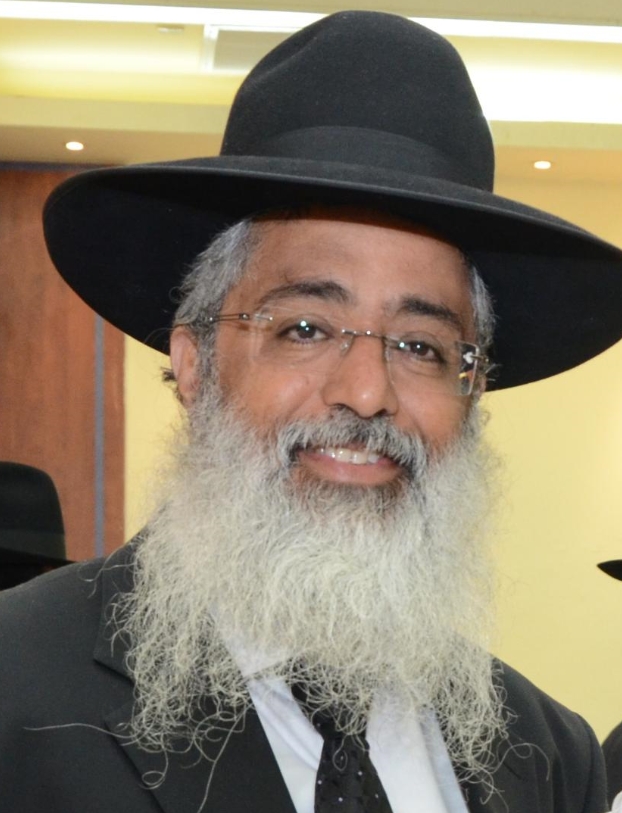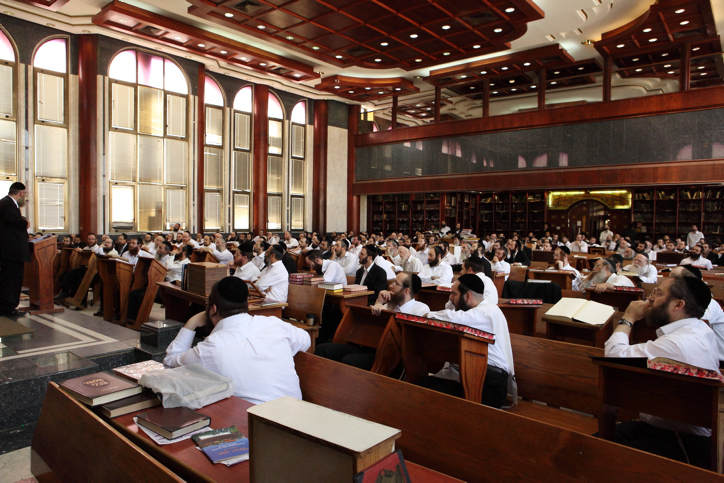Heads of Kollelim Warn: "Torah Institutions Face Collapse"
The economic blow following the coronavirus outbreak presents a challenging situation for the heads of kollelim. In a joint conversation, they discuss halted overseas trips, declining donations, reduced government support, and strategies to sustain their Torah enterprises.
 (Photo Illustration: Nati Shohat / Flash 90)
(Photo Illustration: Nati Shohat / Flash 90)The lockdown imposed on Israeli citizens for about two months severely affected nearly every industrial and development sector in the economy. However, the kollelim and holy yeshivot suffered an even harsher blow. In interviews with several heads of kollelim, they spoke of the dire financial situation created by the coronavirus outbreak and the partial solutions that allow them to cope with the new worldwide reality.
One of the heads of kollel, who manages a kollel in one of the southern cities and requested anonymity, admits in our conversation that his financial state is particularly challenging, to the extent that he is reconsidering the kollel's continuation. "I used to fly to the US several times a year to secure funding for the avreichim," he says. "But now, even as Israel lifts restrictions imposed by the pandemic, in the US—my main source of donations as well as for much of the Torah world—the pandemic is still raging. The new situation has led the wealthy overseas to stop receiving heads of institutions and fundraisers, and those who attempted to reach abroad learned the hard way that they were mistaken. Recently, I heard of someone who nevertheless flew to the US. However, after managing to overcome all bureaucracy and enter the country, he found he had nowhere to sleep at night and had to sleep in his car. It was that severe."
The head of the kollel notes that he tried to obtain donations from abroad, but from a distance. "I activated my connections with various people across the US, and some responded and donated. But the situation is particularly problematic. Long-distance activities are far less effective in a donation-dependent world typically based on personal contacts between the donor and the fundraiser. Additionally, some people don't answer unidentified calls, leaving us—heads of kollelim—facing broken pieces."
 (Photo: shutterstock)
(Photo: shutterstock)In an effort to assist kollelim across the country, some Jewish communities in the US have started mobilizing local charity committees. These new initiatives involve fundraising campaigns in various US cities in favor of the heads of Torah institutions who used to visit the US before the pandemic. "These are lovely donations," says the head of the kollel we are speaking with, "but they are not in the same league as those of the large donors. We're talking about $200-300, which barely keeps our heads above water."
According to the head of the kollel, "The financial status of the magnates is not entirely clear. Many wealthy individuals' economic conditions are unknown during this period. But one can assume some have suffered from the new situation, while others have profited from the pandemic. I know one wealthy individual who supplies medical equipment to hospitals in California and Los Angeles, making millions from the corona crisis," he says.
Meetings Replaced by Phone Calls
Rabbi Yoram Yefet serves as the head of a kollel in Ness Ziona. The kollel, which has graced the small city for three decades, serves as a home of Torah for 25 devout avreichim. Alongside the kollel, there is a telephonic guidance center assisting locals with questions regarding the Jewish home. Rabbi Yefet and his avreichim mainly focus on strengthening and drawing closer young and old in the area, who are afforded the opportunity to connect with Hashem through the kollel's extensive activities. "The kollel is named 'The Rashash Movement' after the Rashash," shares the rabbi, adding, "We witness great divine assistance in the kollel's activities, thanks to the holy Rashash.
 Rabbi Yoram Yefet (Photo: Yehuda Perkovitz)
Rabbi Yoram Yefet (Photo: Yehuda Perkovitz)"I've faced difficult times before," Rabbi Yefet shares, "but now it's a particularly challenging era. Corona has affected the kollel's entire donation network. People are hesitant to donate as long as their long-term financial situation remains unclear. Israeli residents also witness the impact on the global economy and fear for their livelihood, subsequently reducing their contributions to Torah institutions.
"There's also a principal issue," he notes, "the inability to meet donors face-to-face to enlist their support for our extensive projects. During this period, we avoid meeting most of the time, and even when meetings do occur, we wear masks and maintain distance, drastically reducing the effectiveness of fundraising. The personal interaction and face-to-face contact between the donor and the fundraiser play a significant role in fundraising, and the physical distance creates a sense of reduced commitment from donors, significantly reducing donations. This situation is indeed difficult."
Nonetheless, despite the challenges, Rabbi Yefet clarifies that he believes his situation is relatively better. "We primarily work with local donors, so perhaps our damage is less severe. Additionally, we rely on small donations, unlike some kollelim that depend heavily on large contributions. The advantage of relying on small donations is that even if some donors cease contributing, it is relatively easier to find others to fill the gap."
 (Photo Illustration: Yaakov Nahumi / Flash 90)
(Photo Illustration: Yaakov Nahumi / Flash 90)However, the Rashash institutions have managed to find a partial solution allowing them to barely endure the difficult period. "We started working on recruiting donors over the phone," says Rabbi Yefet, clarifying, "there's no comparison between seeing and hearing. Whether it's a telephone operator talking with potential donors or I'm personally speaking with them, it's different from a face-to-face conversation with a donor. In a routine fundraising call, I can show the potential donor our extensive activities, allowing for an optimal impression. Thus, the remote activity results in decreased donations."
The State Reduced Kollel Budgets
Rabbi Moshe Deri, head of 'Meir Ora' kollel in the Herzog neighborhood in Bnei Brak, where about 500 avreichim study, laments the fact that summer sessions did not open as usual in yeshivot and kollelim due to the pandemic. He says, "I feel we've been exiled from the House of Hashem. Although it's a relatively short time, the summer, it's a very quality time, and it's still unclear how and in what form it will take place."
 Rabbi Moshe Deri (Photo: Ovadia Kalimi)
Rabbi Moshe Deri (Photo: Ovadia Kalimi)Rabbi Deri notes that until now he managed to cope with the situation and gather the necessary funds for the institution's operation; however, "the state, which is remembered kindly for its assistance so far and the increased budget it provided recently following the pandemic, has significantly reduced the stipends to kollelim, and the avreichim will receive just 350 shekels. It's a huge blow for me," he says.
The reduction Rabbi Deri talks about continues the trend of budget cuts for kollelim from the government. The government budget for kollelim has fallen by about 50% in the last year, currently standing at just 350 shekels per avreich, down from about 700 shekels. According to him, it's a harsh blow. "We rely on two elements, both donors and the state. Now, the state is cutting budgets and donations have also decreased due to the situation."
Where did you primarily gather donations from till now?
"Typically, I used the personal connections I developed with numerous donors both nearby and from afar. I serve as a mohel in my role, so I meet many people from all walks of life. Additionally, our kollel runs a hotline for Halacha and purity, through which we've met more and more people over time, and every donation people give us adds up to support the kollel."
Rabbi Deri recounts that he is extra cautious these days. "Due to the decline in donations, we have learned to redistribute the budget as it says, 'A king by justice will establish the land.' Our goal is to manage and find balance. Currently, we have enough money, but with an emphasis on the current situation. We still strive not to miss anything for any avreich, and I hope we can continue this way in the future."
Donations Arrived Thanks to Corona
Rabbi Reuven Golan, head of a kollel in Rehovot under 'Derekh Torah' institutions, speaks about the positive aspect of corona: "There is a phenomenon of donations from people seeking salvation from the pandemic. Fortunately, shortly before the pandemic paralyzed the country, we visited the homes of the great leaders of Israel. Among other things, we were blessed by Rabbi Meir Mazuz who promised, 'The kollel supporters will have abundance, livelihood, salvations, and health.' The promise of health during the corona period led many to donate to us to protect themselves from the pandemic through the donation and the blessing of the Tzaddik."
 Rabbi Reuven Golan
Rabbi Reuven GolanUnder Rabbi Golan's institutions and managed by his father-in-law, there are three kollelim. One is considered the largest Sephardi kollel in the Shphela region, with two kollelim in Rehovot and one in Kiryat Ekron, where the avreichim continue to receive their monthly stipend without any change. "The reason is the fact that the kollel is supported, among other things, by donations from within the community," Rabbi Golan explains. "Our kollel relies on the Issachar-Zebulun agreements, which mostly remained despite the situation. We also operate among our community members, the people of Derekh Torah, and synagogue attendees, who feel a need and commitment to the vital institutions and donate to them. All this alongside the fact that our kollel operates through relatively small donations and does not rely on large donors whose livelihood might have been affected by corona. All this prevented us from experiencing a much bigger crisis," he notes.
 (Photo Illustration: Nati Shohat / Flash 90)
(Photo Illustration: Nati Shohat / Flash 90)So can it be said that you are settled?
"Unfortunately, not exactly, because a little does not satisfy a lion. We recently received new avreichim whom we are struggling to accommodate. My father-in-law, Rabbi Ben Zion Salami, who manages everything and is also responsible for the arduous work of obtaining funding for the kollelim, decided to establish the kollel after being wounded in the Yom Kippur War and makes tremendous efforts to admit the avreichim knocking on our doors. However, recently several avreichim came, and we don't know how we can accept them too. Another issue that has harmed us financially is the closing of synagogues for an extended period. As a result, the sale of aliyot, which made a substantial contribution to the kollel's revenue, stopped, and some donations decreased."
Seeing Miracles
Still, coping in these times is immensely challenging, making it seem that only miracles from heaven can help. One kollel head tells 'Hidabroot' that he himself does not know how he managed to raise funds so far for his kollel. "It isn't divine assistance, but actual miracles and wonders," he says, recounting that "I had ties with a wealthy individual in the US. Simultaneously, I was constantly trying to meet his brother, a person of immense financial capability, but without success. During one of my trips to the US, I found out that the brother I was in contact with had fallen and was hospitalized. I decided to visit him at the hospital. When I arrived, I was surprised to see the other brother visiting at the same time. This fortuitous encounter created the much-anticipated connection, and he has supported our kollel with donations since. So instead of me having to come to him, Hashem decided to send him to me..."
Another particularly amazing story he shares relates to the construction of the building housing his kollel. "Before the construction," he says, "I relied on a promise from one donor who gave me the initial sum. However, during construction, his financial situation worsened, and I was left with a half-built building. Shortly afterwards, my wife traveled to Safed. On the way, a conversation developed between her and another woman sitting next to her on the bus. During the course of the conversation, my wife, speaking almost inadvertently, shared the story of the cut-off donation. That woman, at one point, asked her to hold on and said the story touched her heart, and she intended to assist us. The anonymous donor pulled out a checkbook and wrote a check for $5,000 for the kollel. My wife thought that was the end of it, but towards the end of the journey, the donor asked my wife to have me visit her at home. Naturally, I agreed, and during all this time, I kept telling myself: '5,000 dollars is a nice amount, but I'm still far from the actual sum.' On the appointed day, I arrived at her home. She received me warmly, and we conversed for some time. After an hour at her home, she pulled out a checkbook and said she intended to complete the entire sum. I left there with $100,000, enabling me to complete the building. If this story isn't a miracle, what is a miracle?!"

